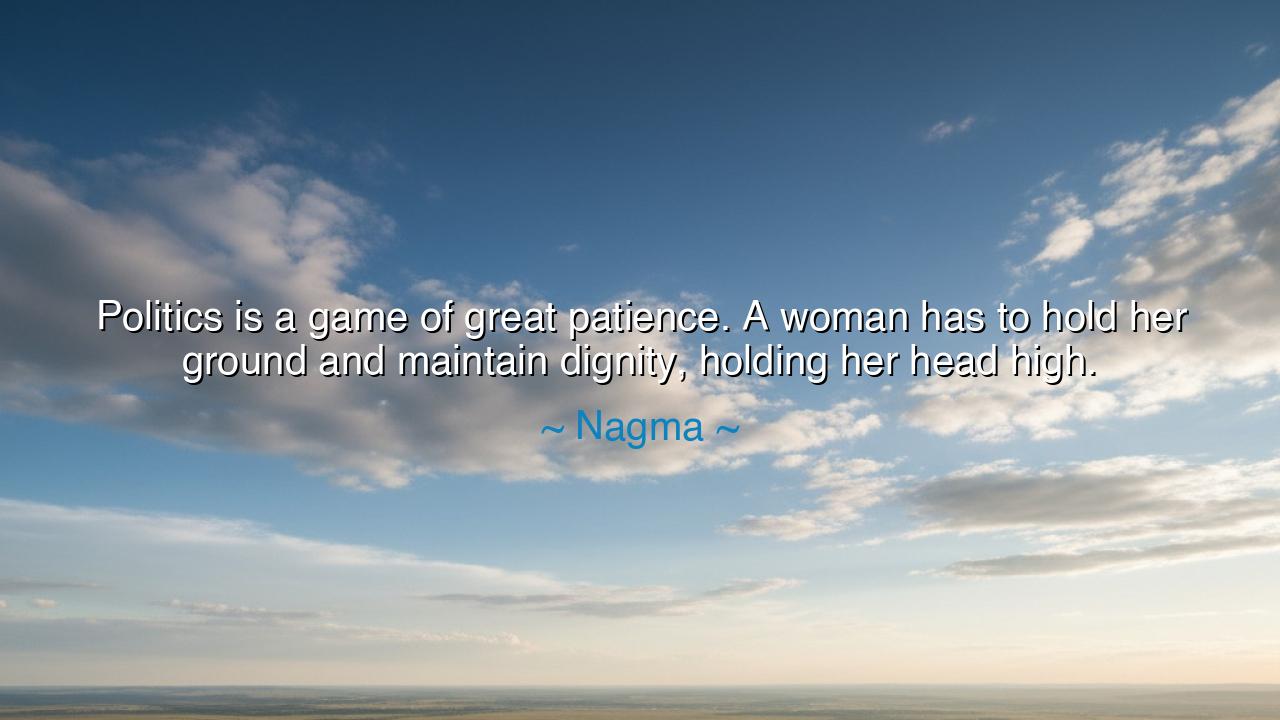
Politics is a game of great patience. A woman has to hold her
Politics is a game of great patience. A woman has to hold her ground and maintain dignity, holding her head high.






Hear, O seekers of wisdom, the words of Nagma, who having walked the path of art and entered the arena of public life, proclaimed: “Politics is a game of great patience. A woman has to hold her ground and maintain dignity, holding her head high.” In this brief but powerful saying is revealed the essence of political struggle—not as a mere contest of voices and votes, but as a test of endurance, spirit, and unshakable honor.
For politics is indeed a game of great patience. Promises do not bloom in a season, nor do reforms flourish in a single year. Laws move slowly through chambers of debate; alliances are made and broken like waves upon the shore. In this storm, impatience is ruin, for those who seek instant glory are swept away by frustration or consumed by rashness. Only those who stand firm, who endure delay and betrayal without losing sight of their purpose, can shape destiny.
But Nagma speaks also of the unique trial faced by women in politics. For they must not only endure the slowness of the system, but also the weight of prejudice and suspicion. To hold one’s ground as a woman in such a space requires double courage: courage to speak when dismissed, and courage to remain silent when provoked, always maintaining dignity. This is the shield against slander, the armor against insult. For dignity, once held, cannot be stolen; it is the mark of a soul unbroken.
Consider, O listener, the story of Indira Gandhi, the “Iron Lady of India.” She stood surrounded by doubt, called weak, mocked as “only a woman.” Yet she learned the patience of politics, enduring criticism and betrayal, until she rose to become one of the most powerful leaders of her nation. Though her legacy is debated, her ability to hold her head high in the face of scorn remains a testament to the truth of Nagma’s words: politics requires patience, and women who endure with dignity rise above the storm.
So too did Eleanor Roosevelt, once merely the shy wife of a president, transform into a voice for human rights on the global stage. She endured ridicule, dismissals, and attacks, but through steady patience, she carved her place as a champion of justice. Her dignity was not fragile—it was her weapon. She understood, as Nagma declares, that to withstand the blows of politics, one must not lower the head in shame, but raise it in quiet, unyielding pride.
The wisdom of this saying is not limited to politics alone. In every field of conflict—be it the workplace, the community, or the family—patience and dignity are the twin pillars of triumph. Impatience breeds folly, anger breeds regret, but patience preserves strength, and dignity commands respect even from enemies. For when one holds the head high, one proclaims: “You may resist me, but you cannot diminish me.”
Therefore, O child of tomorrow, take Nagma’s teaching into your life. When trials delay your hopes, clothe yourself in patience. When others seek to humiliate or provoke, shield yourself with dignity. Hold your head high, not in arrogance, but in unshaken faith in your worth. For whether in politics or in the battles of daily life, victory is not always given to the swift or the loud, but to those who endure, unbowed, until the tide turns in their favor.






AAdministratorAdministrator
Welcome, honored guests. Please leave a comment, we will respond soon